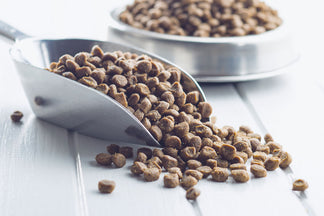By the time you read this article, I bet the pet food industry has already trained you to think that ingredients are the most important thing to consider when choosing a new pet food. Right? Pet store salespeople, pet food manufacturers, and the internet have trained us to think good ingredients = good food.
I used to think this too, back when I was a pet store salesperson. I sold a lot of pet food by telling owners it contained carrots, apples, and no byproducts. These foods had ingredient lists that read like something I would want to eat. It seemed common sense that they would be good for pets. But then I went to veterinary school and found out the truth is more complicated.
Consider this: what would happen if you only ate fresh, high quality, organic, locally raised, free range, humanely slaughtered chicken? Sure, the *quality* of the ingredients in your diet would be great. But because you were only eating chicken and no vegetables or fruit, your diet would be hopelessly imbalanced. That “high quality” diet wouldn’t give you all the nutrition you need. It might take a while, but you’d eventually get really sick. The same thing can happen with pet foods.
For instance, you might know that having Omega-3 fats in your pet’s diet helps them maintain a healthy coat. However, did you know that carnivores, especially cats, have a very hard time digesting flaxseed and other vegetable oils into the useful Omega-3s (DHA and EPA)? And yet, I can find at least one big name brand of cat food that lists on its label: “Flaxseed (source of Omega-3 and Omega-6)”.
The truth is, to get a pet food certified as “complete and balanced” the manufacturer only has to make sure nutrients fit between specified minimums or maximums. They don’t have to know anything about the digestibility of flaxseed.
I’m not saying healthy ingredients aren’t important - they are - but it’s more important to make sure the people making your pet’s food know what they’re doing. Unfortunately, there’s no way to know that from looking at the bag of pet food.
So what do you do? Call up your pet food company (all pet food companies are required to put contact information on their bags) and ask them – who formulates your diet and what are their qualifications? If they say “John” and “He’s been doing it for us for 10 years”, that’s not a good enough answer. It’s a frighteningly common answer, but not a good one. You want the answer to be “a board certified veterinary nutritionist” or someone who has their pHD in animal (not human) nutrition. If they’ve published research on nutrition in peer reviewed journals, even better.
If you’re trying to make a diet at home, hold yourself to the same standard. Many pet food recipes in books or online, even those supposedly written by veterinarians, are NOT complete and balanced. Ask your vet to refer you to a board certified veterinary nutritionist to formulate your homemade diet.By all means, feed your pet a diet with amazing ingredients. But remember, nutrients beat ingredients in the battle to keep your pet healthy.
Petnet(io) Editors note: We think Dr. Courtney is spot on with her thoughts on balanced nutrition. We would add a few points as well. First, the nutrient minimums (as set by AAFCO) do not take into account food synergies. One example is how the minerals calcium and phosphorus are interrelated and should be served in proportion to one another. Second, there can be a difference in the body’s ability to utilize whole vitamins versus isolated or synthetic vitamins. Adding isolated to synthetic vitamins to a food may allow the food to meet the complete and balanced requirement without providing the pet with the nutrients that it needs.

 Food
Food
 Food
Food
 Food
Food
